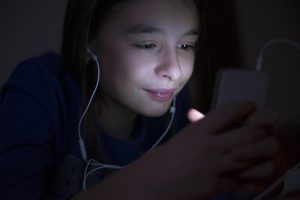
Reports suggest that children and youth used technological devices up to seven and a half hours a day.
The new findings go along with other studies which are emerging that reveal the negative consequences of technology use in youth.
Ming added, “”During the last few years I have noticed an increased use of smartphones by my patients with sleep problems. I wanted to isolate how messaging alone – especially after the lights are out – contributes to sleep-related problems and academic performance.”
To conduct their study, the researchers administered surveys across three New Jersey Schools and evaluated 1,537 responses, looking at grade, sex, messaging duration, and time of day when texting occurred.
Results uncovered that those students who turned off their devices or messaged for less than 30 minutes after lights went out, performed better academically compared to those who continued to text late at night for over 30 minutes.
Late-night texting also resulted in shorter sleep and thus led to greater tiredness during the day. “Blue light” emitted from technology devices can have a large effect on daytime sleepiness as it can delay the release of melatonin.
“When we turn the lights off, it should be to make a gradual transition from wakefulness to sleep. If a person keeps getting text messages with alerts and light emission, that also can disrupt his circadian rhythm. Rapid Eye Movement sleep is the period during sleep most important to learning, memory consolidation and social adjustment in adolescents. When falling asleep is delayed but rising time is not, REM sleep will be cut short, which can affect learning and memory,” added Ming.
Ming suggests that educators inform students about the importance of sleep and incorporate sleep education into the curriculum. “Sleep is not a luxury; it’s a biological necessity. Adolescents are not receiving the optimal amount of sleep; they should be getting eight and a half hours a night. Sleep deprivation is a strong argument in favor of later start times for high schools – like nine a.m.,” Ming concluded.
Sources:
http://www.eurekalert.org/pub_releases/2016-01/ru-tan012616.php